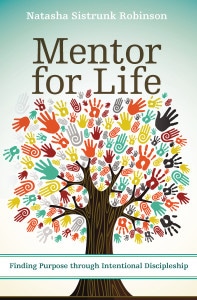Natasha Sistrunk Robinson and I are in a Facebook writing group together, and I’ve grown to appreciate her practical and enthusiastic approach to leadership. She is a thoughtful encourager and a focused visionary. A former Marine Corps officer, Natasha is also talented and experienced in the nuances of leadership and intentional discipleship. Natasha’s book, “Mentor for Life,” released earlier this month and you’ll want to pick up a copy for yourself. The book is chock-full of solid advice and helpful questions at the end of each chapter that help focus your personal leadership journey. I’ve got one copy of Natasha’s book to give away for this week’s edition of my #MarchMadness book giveaways. Read to the end of today’s conversation, and then follow the instructions to enter for your chance to own a copy of this insightful book.

Why is mentorship in the church important?
Natasha: In the book, I refer to mentoring as “intentional discipleship.” How we as Christians use the influence God has given us to shape the life of another person is unbelievably important. I believe mentoring in the church should be approached from a communal, relational context. When you think of mentoring, you probably automatically picture a one-on-one scenario. While there is definitely value in one-on-one mentoring relationships, I’ve seen both in my own life and in my studies through the Bible that God may connect you with many mentors who will all play a part in shaping your life.
What we know from the Bible is that it is an Eastern book. This means culturally and contextually, the Bible is often referring to what is happening within community, family, people groups, and what is best for the whole. It’s not an individualistic thing at all. My model for mentoring as intentional discipleship is inspired by Jesus’ relationship with His twelve disciples. When we see Jesus interacting with and teaching His disciples, He’s doing this with them as a group. Even the more intimate relationship He had with The Three (Peter, James, and John) was still with a small group! Not to say that Jesus didn’t have one-on-one relationships with each of His disciples! The Bible just doesn’t seem to highlight that importance. It instead focuses on what Jesus wants the disciples to learn as a group, for the purpose of shaping and changes the nations who cry out to God.
Think back to the creation story and the birth of Adam. The only thing God says isn’t good (before sin) is the fact that Adam is alone. What I think is critical to see is that God was present with Adam in the garden, and the garden was originally a sinless environment. In that good and perfect (or sinless) environment, God still sees Adam’s aloneness as a bad thing. Adam being paired with someone compatible is something God valued, and he still values today for His children. We need to understand that God was very intentional in saying that it’s not good for Christians to be alone and isolated in this world.
There are many issues I believe need to be addressed in the church, but one of the bigger ones is the “80/20 rule,” which is the idea that 20% of people in the church are doing 80% of the work. Pastors and those that have been identified as leaders in the church are often dealing with burnout. This is mainly due to the church not adequately training or equipping other leaders. It is because of this phenomena that I believe mentorship and discipleship in the church is everyone’s responsibility.
The mentoring framework I share in “Mentor for Life” is three-tiered: knowing and loving God, understanding and affirming our identity in Christ, and loving our neighbors. If we are raising up, through mentorship, people in the church with an understanding of their purpose and identity in light of who God is, we will find ourselves with more leaders. When you have more leaders, you have more sharing of the work that needs to be done. According to the apostle Paul in 1 Corinthians 12, when the body of Christ works together, the work of the kingdom of God goes forth. This is why it’s so important for those in the church to understand their purpose in life and their place in the body.
So why wouldn’t you mentor in the church? Seeing the results of not prioritizing discipleship well should alert us to the fact that the church is not fully empowered and not fulfilling the complete work that God has called us to.
How do you think the church will benefit from the message of your book?
Natasha: I think the church will be challenged by Mentor for Life, specifically because it is not a how to book. It is a book that calls us back to the priority of our primary calling to make disciples who follow Jesus with their entire being by laying down their lives for the sake of the gospel and this great kingdom mission God has set before us. I think the church has relevant concerns and challenges in today’s culture, but we are not without hope in this world. I believe in the vision of the Lausanne Movement: “The whole church taking the whole gospel to the whole world.” We can do that whether we are going out as missionaries to other parts of the world, or whether we are faithful and credible witnesses to the various people groups God has already put in front of us. Any devout believer wants to make disciples of Jesus, yet in our daily lives we become distracted, and what this book does is it resets our priorities and challenges us to allow everyone to overflow out of Jesus’ prayer for God’s kingdom to come on earth as it is in Heaven. Mentor for Life challenges and equips the church to focus on the gospel and Jesus’ simple call to “follow me” and we do that by making disciples through relationships in an intimate small group of intentional learning.
Does spiritual mentorship have any effect on a person’s professional life? Can spiritual and professional mentorship work hand-in-hand?
Natasha: Yes, the two absolutely work together. I’ve experienced this in my personal life and I’ve been able to be a mentor spiritually and professionally for others.
In preparation for the book launch, I am having a kickoff event at my church. This event has been designed as an educational opportunity for church members and the public to have a better understanding of mentorship as intentional discipleship. Part of the event will include a panel discussion with mentors of mine, past and present. It was important for me to have these mentors present, because I wanted to show the different sides of mentoring and how everything works together.
One of the ladies that will be on the panel was my boss when I worked at the Department of Homeland Security. When I decided to leave the military and pursue a career, I had three job offers. All were good, which made my decision a little more difficult. I called an alumnus of the Naval Academy and sought her counsel regarding my decision. She had actually worked for one of the companies that was offering me a job, but advised me to go work at the Department of Homeland Security because of the skill set and influence of the woman that would be my boss.
During my interview for the job, my future boss seemed to sense (more than I had) how unsure I was about the job. I’m typically a confident person, but after having been in the military for eleven years, that was all I knew. The thought of starting something new was unsettling for me. My boss seemed to understand this fear, and she told me, “I can sense that you aren’t sure about this. But let me tell you this. Come here and do a good job. Network and meet great people, and use this job as your ‘transition’ job to figure out what you want to do.”
Having that freedom and support gave me a great sense of safety about this job and new career. It was about this time that I began writing for Christianity Today. I sent my boss the first article I had published, and she ended up calling me into her office and talking with me for a good half hour about it! It was so encouraging to hear from her, this accomplished woman, how much she’d gotten out of what I’d written. She encouraged me to keep writing, and later, she encouraged me to pursue going to seminary.
I’m so blessed to have this woman as a mentor and friend. She is an amazing example of how to be a Godly influence in a secular environment. Whether they knew it or not, everyone who came in contact with her saw Jesus. What better example of marrying spiritual and professional mentorship could there be?

Natasha Sistrunk Robinson is the author of Mentor for Life: Finding Purpose through Intentional Discipleship and the visionary founder of the nonprofit, Leadership LINKS, Inc. She is a graduate of Gordon-Conwell Theological Seminary Charlotte (cum laude, M.A. Christian Leadership) and the U.S. Naval Academy. A former Marine Corps officer, Natasha serves as a Bible teacher, writer, anti-human trafficking advocate, and champion for education. She has over 15 years of leadership and mentoring experience in the military, government, church, seminary, and nonprofit sectors. She is a sought after leadership consultant, mentoring coach, and speaker. Connect via her official website www.NatashaSRobinson.com, blog www.asistasjourney.com, Twitter @asistasjourney, or www.facebook.com/NatashaSistrunkRobinson.

Feeling as if the world has gone a little bit mad? No worries! I’ve got you covered! You might want to escape to some lush green island where there are drinks with umbrellas and lawn chairs, but I’ve got the next, best thing. Each Thursday, during the month of March, I’ll be giving away books! Some days I’ll give away one book, and other days I’ll mix it up. It’s my small offering to say thanks for hanging in there, you can do this, and we’re all in this together! Follow the instructions in the Rafflecopter to enter to win a copy of Natasha’s book, Mentor for Life.
I’m a mom and an influencer.
I am an ezer wife, a mom of 3 boys, a women’s ministry leader and Bible teacher.
“I am an ‘ezer’ wife.” I love it! Sounds like we have been reading some of the same stuff, Shereen. Blessings to you.
This book sounds great, and I enjoyed the Q & A. If i could ask Natasha a question, it would be for her insight into how to mentor without turning the the relationship into a project. I’ve found this especially in church relationships, but am also interested because I have a Little as I participate in Big Brothers Big Sisters of America. Maybe she discusses it in her book 🙂
Thanks for such an important question, Julie! I will address on my blog http://www.asistasjourney.com for “Mentoring Monday’ this upcoming week. Blessings, Natasha
Thanks, Natasha! I’ll make a note and check it out on Monday for sure.
This looks like a great book So lovely to meet Natasha today! 🙂
So as the head of Resources for Young Life College, I am passionate about mntoing. I truly believe this is bow we grow the body of Christ. I have been discipling college girls for over 35 years. I will read this book and can’t wait to learn new stuff
Hi Missy, My senior pastor served in Young Life for years. I pray this books is a valuable resource for you. I have other free resources to assist you at my official website, http://www.NatashaSRobinson.com. Blessings,
I am a wife, mom, and missionary… always looking for more ideas of how to intentionally disciple the people God puts in my life.
Thanks for your interest, Julie. I have other free resources to assist you at my official website, http://www.NatashaSRobinson.com. Blessings,